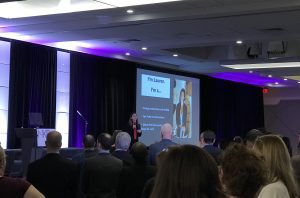Lauren Caselli gives tips on increasing event attendance and interest. By Loren Kessell
Event planning requires careful thought and planning that is sometimes overlooked. Lauren Caselli, founder and CEO of Lauren Caselli Events in Bozeman, Montana, believes that dinner parties possess the ability to change the world.
Caselli presented during NKBA’s Chapter Officer Training at KBIS in Las Vegas last week to shed some light on the art of event planning in order to help chapter officers strengthen their event attendance. It can be easy to get lost during the planning process, so Caselli provided guidance.
“I want to bring you back to the ‘why,’” Caselli said.
1. Foster Community
Caselli shared that in-person experiences convert at 74%, because these people typically engage in preliminary research prior to the event. This means they’ve already “bought into” the idea, and they are more likely to return. Take time to ask attendees what they want and utilize the 10 most engaged members to brainstorm. Communities grow through word of mouth 90% of the time, so utilize social media tools such as Facebook and LinkedIn for extra exposure.
2. Establish Contacts

PHOTO BY: LOREN KESSELL
Network, network, network! Gaining contacts is key, and they can be met at the event. It’s helpful to speak with people who can be contacted afterward to help consult. And, this allows for future collaboration.
3. Strengthening Clientele
Assume a leadership position and make it known. This attracts people looking to learn and those who are interested in the event. Making connections with industry professionals creates a strong base that will attract new members.
4. Keep it Consistent
Consistency is key, and the most important element for a successful event. Pick out the venue far in advance and determine the date and time. This sets the foundation, and it will generate attendance when the event happens at a similar time every year, and it creates excitement as a byproduct of anticipation. If the event host exudes excitement, it will spread to attendees.
5. Impact vs. Effort—High Impact, Low Effort
Event planning includes three key components: programming, planning and marketing. The event planner needs to delegate certain tasks that may seem like a lesser priority in order to focus on the core purpose. The venue should be booked early, but the planning can occur even two weeks prior. Finally, market consistently leading up to the event and do not feel like it’s a bother: People lead busy lives and need reminders. Streamlining the process, delegating tasks and not being afraid to repeat great events achieves high impact while expending low effort.
But, Caselli’s most important piece of advice is this: do what works for you.
For more information on Caselli’s services, contact her at www.laurencaselli.com.








